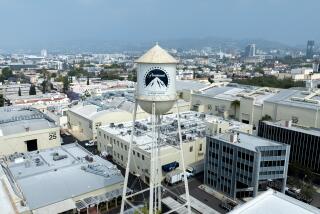German Giant Looks for Help
- Share via
ISMANING, Germany — Like an impoverished maiden of yesteryear, the Kirch Group media empire has been primped up and paraded out to lure well-heeled suitors in hopes of financial rescue.
But despite the debts pressuring it toward a quick corporate marriage with Italy’s Mediaset or Rupert Murdoch’s News Corp., the giant, privately held conglomerate still owned and run by reclusive founder Leo Kirch has maneuvered to evade proposals that would break its independence.
Kirch restructured his array of 40-odd companies at the start of this year, creating three corporate groupings under a family-owned foundation. By splitting off the as-yet-unprofitable digital pay-television operation into its own group, Kirch hopes to make the rest of his holdings more attractive to potential investors.
One of Germany’s richest captains of industry, Kirch has invested so heavily in his DF-1 pay-TV channel that cash-flow problems are now hindering the competitiveness of the group’s bread-and-butter businesses.
Among the costly purchases to attract DF-1 viewers was a Hollywood shopping spree in 1996, when Kirch spent as much as $10 billion to acquire blockbuster film rights, and his acquisition--for an undisclosed sum--of exclusive worldwide broadcast rights to the next two World Cup soccer championships in 2002 and 2006.
But with those bills coming in faster than new subscribers, Kirch now needs partnership with a more liquid media group to maintain prominence in the core activities of commercial television, film and programming distribution and co-production.
A merger with Mediaset, Italy’s largest private broadcaster, would create Europe’s biggest broadcasting alliance and allow Kirch, already the biggest programming distributor outside the United States, to compete against major U.S. producers.
Kirch distributes everything from dubbed South American soap operas to German-language versions of hot American commodities such as “ER” and “The X-Files.”
“We are a big company already, but it makes sense to get bigger to do these huge co-productions and to be able in the future to expand our businesses,” said Kirch spokesman Johannes Schmitz. “We can finance our own activities, but if we want to expand, it makes sense to get bigger.”
He and other executives burrowed into modest quarters in this Munich suburb say negotiations with several big media players are nearing a conclusion. Italian magnate and former Prime Minister Silvio Berlusconi is said to be closest to making a match between his Mediaset and Kirch, but Murdoch and Saudi Prince Al Waleed continue to float in and out of the talks with rival offers.
“For obvious reasons, we cannot discuss the details of negotiations. But what we’ve said is that we expect the negotiations to be concluded within the first quarter,” Schmitz said.
Kirch’s assets were reconfigured to ease investors’ concerns that their stakes would go into the pay-TV money pit instead of expansion of the core businesses more likely to provide swift returns.
What Kirch is trying to sell to its suitors is an interest in the new Kirch Media group that shelters commercial television and distribution, while keeping a distance from the troubled Kirch pay-TV activities and its debts.
The extent of Kirch’s debt has never been made public, but European financial newspapers have quoted unnamed partners in the merger talks as saying they were told by Kirch that net debt stands at $1.6 billion. The same Kirch sources are reported to estimate net worth at $12 billion.
Kirch managers may be making a virtue of necessity, but they say they are content to go it alone in digital pay-TV and remain convinced they will profit in the long run.
“It’s developing positively, but it will take another year or so before it begins paying off,” said Dieter Hahn, Kirch managing director. “But we need substantial additional investments, probably 2 billion marks [$1.1 billion], before we’ll reach the break-even level with pay-TV.”
Getting investment from a foreign partner into other operations will free up Kirch funds for those remaining development costs, said Hahn.
Kirch has increased its digital pay-TV subscriber base tenfold in two years to 300,000, but it remains a distant second to rival Bertelsmann’s Premiere, which has 1.6 million subscribers.
The two competitors tried last year to cooperate in developing the digital market with a pay-TV joint venture, but the German Cartel Office and the European Union commission safeguarding competition scuttled that plan.
The privately owned Kirch remains opposed to selling shares in its companies for fear of interference from stockholders.
“Once you go to the capital markets, your decision processes have to change. You’re no longer able to move with the same speed,” Hahn said in explaining why Kirch has resisted that option. “The decision to buy the football World Cup rights happened with one phone call at 1 a.m. That kind of decision can’t happen in a boardroom.”
Rumors emanating from the Murdoch camp late last year had the Australian magnate and owner of the Los Angeles Dodgers pondering a $1-billion investment in Kirch Group, although Murdoch has since denied there was ever discussion of such a significant investment and a Kirch executive said that partnership no longer seems likely.
More to Read
The biggest entertainment stories
Get our big stories about Hollywood, film, television, music, arts, culture and more right in your inbox as soon as they publish.
You may occasionally receive promotional content from the Los Angeles Times.











